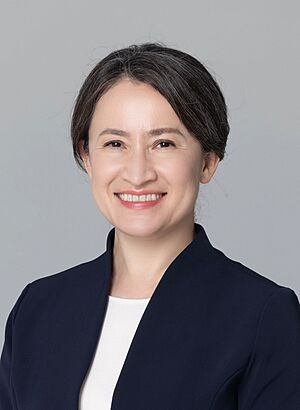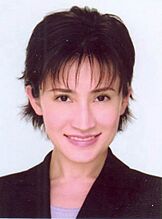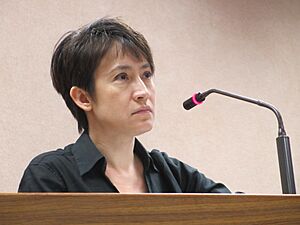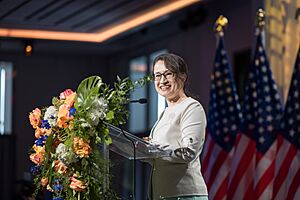Hsiao Bi-khim facts for kids
Quick facts for kids
Hsiao Bi-khim
|
|||||||||||||||||
|---|---|---|---|---|---|---|---|---|---|---|---|---|---|---|---|---|---|
|
蕭美琴
|
|||||||||||||||||

Official portrait, 2024
|
|||||||||||||||||
| 13th Vice President of the Republic of China | |||||||||||||||||
| Assumed office 20 May 2024 |
|||||||||||||||||
| President | Lai Ching-te | ||||||||||||||||
| Preceded by | Lai Ching-te | ||||||||||||||||
| 15th Representative of Taiwan to the United States | |||||||||||||||||
| In office 20 July 2020 – 30 November 2023 |
|||||||||||||||||
| President | Tsai Ing-wen | ||||||||||||||||
| Preceded by | Stanley Kao | ||||||||||||||||
| Succeeded by | Alexander Yui | ||||||||||||||||
| Member of the Legislative Yuan | |||||||||||||||||
| In office 1 February 2012 – 31 January 2020 |
|||||||||||||||||
| Preceded by | Wang Ting-son (9th) | ||||||||||||||||
| Succeeded by | Fu Kun-chi (9th) | ||||||||||||||||
| Constituency | Hualien County (9th) Party-list (8th) |
||||||||||||||||
| In office 1 February 2002 – 1 February 2008 |
|||||||||||||||||
| Constituency | Taipei 1 (6th) Overseas (5th) |
||||||||||||||||
| Personal details | |||||||||||||||||
| Born |
Bi-Khim Louise Hsiao
7 August 1971 Kobe, Japan |
||||||||||||||||
| Citizenship | Taiwan United States (until 2002) |
||||||||||||||||
| Political party | Democratic Progressive Party | ||||||||||||||||
| Education | Oberlin College (BA) Columbia University (MA) |
||||||||||||||||
| Chinese name | |||||||||||||||||
| Traditional Chinese | 蕭美琴 | ||||||||||||||||
| Simplified Chinese | 萧美琴 | ||||||||||||||||
|
|||||||||||||||||
Hsiao Bi-khim (born August 7, 1971) is a politician and diplomat from Taiwan. Since 2024, she has been the Vice President of the Republic of China, serving with President Lai Ching-te.
Before becoming vice president, she was Taiwan's representative to the United States from 2020 to 2023. This job is similar to being an ambassador. She also served for many years in Taiwan's government body that makes laws, called the Legislative Yuan.
Hsiao is a member of the Democratic Progressive Party (DPP). She is known for her work in foreign policy, which means she helps manage Taiwan's relationships with other countries.
Contents
Early Life and Schooling
Hsiao Bi-khim was born in Kōbe, Japan. Her father, Hsiao Ching-fen, is from Taiwan, and her mother, Peggy Cooley, is from the United States.
She grew up in the city of Tainan in southern Taiwan. As a child, she learned to speak Mandarin, Taiwanese Hokkien, and English. When she was a teenager, her family moved to the United States. She went to high school in Montclair, New Jersey.
After high school, Hsiao attended Oberlin College and studied East Asian studies. She later earned a master's degree in political science from Columbia University. She was studying for her Ph.D. but left to return to Taiwan to help with the important 1996 presidential election.
Starting Her Career in Politics
While in the United States, Hsiao became involved with the Democratic Progressive Party (DPP). The DPP is one of the main political parties in Taiwan. When she returned to Taiwan, she became the party's director of international affairs.
In 2000, when Chen Shui-bian became president, Hsiao worked as his advisor and interpreter. At the time, she was a citizen of both Taiwan and the United States. A new law required government workers to be only Taiwanese citizens, so she gave up her U.S. citizenship in 2002.
Working in the Legislative Yuan

In 2001, Hsiao was elected to the Legislative Yuan, which is Taiwan's main law-making body, like the U.S. Congress. She was reelected in 2004 to represent a district in Taipei. As a legislator, she worked on important committees that dealt with foreign relations.
Hsiao focused on several key issues. She worked to protect women's rights and the rights of foreigners living in Taiwan. She also cared deeply about animal rights and helped improve the Animal Protection Act.
In 2005, Hsiao was elected as a vice-president of an organization called Liberal International. During a trip to Bulgaria for the organization, she reported that people from the Chinese embassy were following her and other Taiwanese representatives.
Hsiao returned to the Legislative Yuan in 2012. In 2016, she was elected to represent Hualien County. She was a strong supporter of legalizing same-sex marriage, and she continued to support the LGBT community even when faced with pressure. She lost her seat in the 2020 election.
Representing Taiwan in the United States
After leaving the legislature, Hsiao was appointed as Taiwan's representative to the United States in June 2020. She was the first woman to hold this important position.
In January 2021, she was officially invited to the inauguration of U.S. President Joe Biden. This was a major event because it was the first time a Taiwanese representative had officially attended a U.S. presidential inauguration since 1979.
Because of her support for Taiwan's independence, the government of China put her on a blacklist in 2022 and again in 2023. This means she is not allowed to travel to mainland China, Hong Kong, or Macau.
Becoming Vice President
In November 2023, Lai Ching-te, the DPP's candidate for president, chose Hsiao to be his running mate for vice president. In January 2024, they won the election. This was the third time in a row that the DPP won the presidency.
As vice president-elect, she visited the United States and the Czech Republic in March 2024. During her visit to Prague, the capital of the Czech Republic, a car from the Chinese embassy was caught following her. The incident led to an investigation by the Czech government.
In May 2024, she spoke in support of Taiwan joining the World Health Assembly, an international health organization. In August, China's government publicly named her as a "die-hard Taiwanese independence separatist." Taiwan's government criticized this action, saying it hurt the chances for positive talks between the two sides.
Personal Life
Hsiao's father, Hsiao Ching-fen, was the president of a university in Tainan.
Hsiao is a well-known cat lover. When she moved to the U.S. to be Taiwan's representative, she brought her four cats with her. She famously said she would counter China's aggressive "wolf warrior" diplomacy with her own "cat warrior" diplomacy, showing a firm but friendly approach.
Honors



